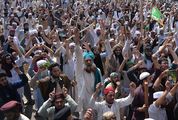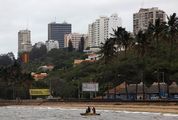THE African National Congress (ANC) remains biased towards the working class and the left, and despite differences in ideological outlook, the tripartite alliance is still relevant, says ANC president Jacob Zuma.
Addressing the Congress of South African Trade Unions (Cosatu) national congress in Midrand on Monday, Mr Zuma said organising workers was even more important than "debating and politics" with the ANC interested in a "conscious and thinking working class".
The alliance between the ANC, South African Communist Party and Cosatu was "unique" in global politics and would continue to attract organised attempts to destroy it, he said. It was likely to remain "as long as there are poor and unemployed in SA".
The alliance was based on a sound understanding of each others’ goals, and despite changes, including differing economic conditions, it "remains as relevant as ever to the present-day South Africa as it was before 1994 — if not even more so", Mr Zuma said.
Cosatu delegates are meeting until Thursday for their 12th congress, at which they will elect new leadership and make resolutions for the next five years.
The state of the tripartite alliance is under the spotlight amid internal battles within Cosatu that have prompted accusations that the alliance is dominated by a "right-wing clique" of leaders, reducing the autonomy of working class.
Mr Zuma said many within the alliance "had been together so long" they forgot each other’s political goals, even as they co-operated.
The ANC did not "get rid of classes" but sought to balance different economic interests, he said. "It is important to reaffirm that the ANC remains biased to the working class — the fact that it is a multi-call movement does not contradict this latter point."
The party did not fight for socialism, but there were "people fighting for socialism". The ANC fought for harmony and democracy, he said.
Mr Zuma said the alliance was based upon struggles on the ground, not agreements struck between leaders. It was also formed with an understanding of each others’ differences and agreement on concrete challenges.
"We must ask ourselves whether those conditions still prevail today — if they do or do not they must define the new conditions if that is what we believe, and determine the basis and place of our organisations and the alliance itself," Mr Zuma said.

Jacob Zuma. Picture: GCIS
THE African National Congress (ANC) remains biased towards the working class and the left, and despite differences in ideological outlook, the tripartite alliance is still relevant, says ANC president Jacob Zuma.
Addressing the Congress of South African Trade Unions (Cosatu) national congress in Midrand on Monday, Mr Zuma said organising workers was even more important than "debating and politics" with the ANC interested in a "conscious and thinking working class".
The alliance between the ANC, South African Communist Party and Cosatu was "unique" in global politics and would continue to attract organised attempts to destroy it, he said. It was likely to remain "as long as there are poor and unemployed in SA".
The alliance was based on a sound understanding of each others’ goals, and despite changes, including differing economic conditions, it "remains as relevant as ever to the present-day South Africa as it was before 1994 — if not even more so", Mr Zuma said.
Cosatu delegates are meeting until Thursday for their 12th congress, at which they will elect new leadership and make resolutions for the next five years.
The state of the tripartite alliance is under the spotlight amid internal battles within Cosatu that have prompted accusations that the alliance is dominated by a "right-wing clique" of leaders, reducing the autonomy of working class.
Mr Zuma said many within the alliance "had been together so long" they forgot each other’s political goals, even as they co-operated.
The ANC did not "get rid of classes" but sought to balance different economic interests, he said. "It is important to reaffirm that the ANC remains biased to the working class — the fact that it is a multi-call movement does not contradict this latter point."
The party did not fight for socialism, but there were "people fighting for socialism". The ANC fought for harmony and democracy, he said.
Mr Zuma said the alliance was based upon struggles on the ground, not agreements struck between leaders. It was also formed with an understanding of each others’ differences and agreement on concrete challenges.
"We must ask ourselves whether those conditions still prevail today — if they do or do not they must define the new conditions if that is what we believe, and determine the basis and place of our organisations and the alliance itself," Mr Zuma said.






















Change: 1.37%
Change: 1.32%
Change: 2.91%
Change: 0.45%
Change: 3.09%
Data supplied by Profile Data
Change: 1.63%
Change: 0.83%
Change: 1.37%
Change: 0.00%
Change: 0.69%
Data supplied by Profile Data
Change: -2.04%
Change: -1.88%
Change: -1.66%
Change: -1.94%
Change: -1.37%
Data supplied by Profile Data
Change: -1.25%
Change: 0.00%
Change: -0.85%
Change: -1.74%
Change: 2.92%
Data supplied by Profile Data